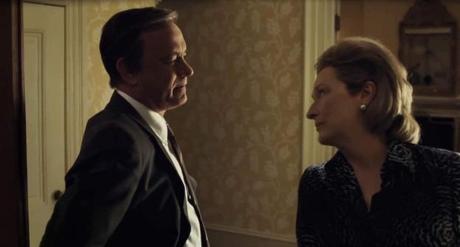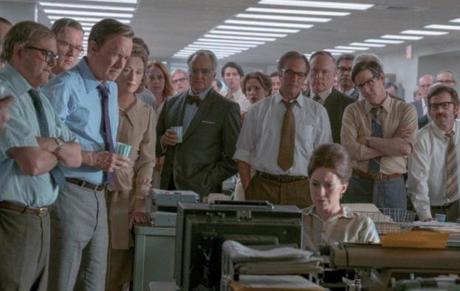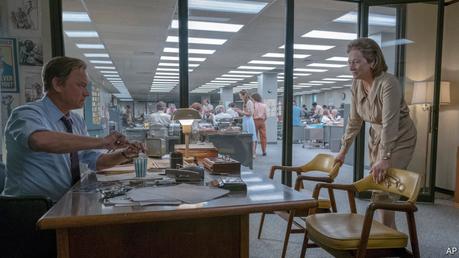Steven Spielberg is not normally a spontaneous filmmaker. When he finds projects he likes he sits on them and mulls them over for years before ever making it to set. Tin-Tin took 30 years. Schindler's List took 12. The Post, however, took less than 1. In fact, he needed just 9 months to go from reading the script to locking his final cut of the completed film. Had he taken more time he probably would have ended up making a more complex and ultimately better movie, but in sacrificing thoroughness for relevance he produced something which has all of the prestige period piece trappings of Lincoln and Bridge of Spies but nowhere near as much of the stodginess. Instead, The Post is the work of a filmmaker clearly working with a renewed sense of energy and purpose and thus less hesitant, for better or worse, to indulge in some undeniably old-fashioned Capra-corn. Nobody flat-out reads the first amendment while inspiring music swells, ala The Majestic, but they might as well.
The reasons for this are boldly transparent: 1) Trump's ongoing war with the press; 2) The rising tide of female empowerment. Spielberg found the perfect outlet for his personal anxieties over the former and sense of engagement with the latter in 31-year-old Liz Hannah's spec script about publisher Katharine Graham and Washington Post editor Ben Bradlee's 1971 decision to [ spoiler from almost 50 years ago] publish The Pentagon Papers, a series of documents exhaustively chronicling the government's ongoing lies about Vietnam. Here is the true story of a little-respected, self-doubting woman who found her confidence and stood up to the most powerful man in the country, President Nixon, who saw the Pentagon Papers as a threat to national security, and her bulldozer of a editor who pushed her to risk everything in defense of free speech and the freedom of the press.
To briefly recap the history and thus the plot of the film, which takes place over just 10 days: The New York Times broke the story of The Pentagon Papers, but Nixon and the Attorney General forced them to stop and took them to court. Then The Washington Post, considered a second-rate publication at the time, obtained access to the same documents and had to decide whether to pick up the journalistic baton and race it across the finish line or to wait and let the Times possibly die alone in their day in court. Publishing could have meant the end of the paper and possible jail time for all involved. The Post dramatizes this from Graham (played to complex perfection by Meryl Streep) and Bradlee's (played with an almost embarrassing, one-note bluster by Tom Hanks) point of view.

Of course, a year after this event Graham and Bradlee found themselves fighting with Nixon again over Watergate, continuing to pursue it long after every other publication had moved on from the story, but Hollywood already made a movie about that. It's called All the President's Men. It won 4 Oscars, including one for Jason Robards' performance as Bradlee, around the same time Spielberg was in pre-production on Close Encounters of the Third Kind.
The Post isn't about Watergate. To paraphrase Halt and Catch Fire, it's about the thing (The Pentagon Papers and the ensuing Supreme Court case contesting the limits of the free press) that got us to the thing (Watergate and Nixon's resignation) and is a clear voice of support for today's under siege journalists whose necessity and freedoms should be upheld lest we lose one of our last checks on power.

What's surprising, though, is how little The Post 's specific discussion of free speech actually manages to resonate. Perhaps it's my own jaded view of government and institutions or perhaps it's a genuine failure of the film, but I never fully felt the outrage at the government's lies or sense of betrayal. We see montages of headlines flying by and hear astonished proclamations from side characters as they read the Papers in the newsroom for the first time but very little of it manages to stick because almost none of it is ever expanded upon. Beyond that, the government's position on the matter is oversimplified and almost entirely relegated to the actual audio tapes of Nixon venting his anger to Henry Kissinger and his Press Secretary.
This is largely because the specifics of The Pentagon Papers are immaterial to the point of The Pos t. This isn't, after all, a movie about the government lying to us for decades about Vietnam. There's a Ken Burns documentary that handles that. No, this is a movie about the business of journalism and the importance of speaking truth to power.
The latter part is depicted in thrilling fashion, dropping us into the bustling newsroom and then, later, Bradlee's own home/emergency publication hub. Spielberg and his longtime DP Janusz Kaminski film most of this with a Sidney Lumet-inspired intensity, utilizing Steadicams and handhelds to beautifully (and sometimes quite messily) capture it all. But it's still mostly boilerplate "Get me the story!" newspaper movie material, much the same as Spotlight or All the President's Men just with the intensity level raised up considerably higher.
The actual dynamic part of the story lies with Graham, who has far more to lose than anyone else and much more growth to experience. Thrust by family tragedy into a job she didn't actually want, she has to learn in just 10 days to speak up for herself and get past her own as well as her colleague's antiquated views on gender power dynamics. Spielberg's work here is never subtle, right down to creating a composite asshole sexist character you just want to punch (played quite punchably by Bradley Whitford), yet still effective in an old-school Hollywood mythmaking way, using two specific instances of Graham silently passing by crowds of fawning women in an obvious effort to turn her into a feminist icon. Beyond that, Graham, quite crucially, is the only character in the film whose outrage over The Pentagon Papers rises above an academic level as she eventually and quite heartbreakingly reflects on her son's time in Vietnam and how it was all based on lies.
THE BOTTOM LINE
The Post is the odd film which looks every bit the part of Oscar Bait: The Movie but is instead a genuine passion project made not to win awards but instead to comment on the ills of today through the lens of history. The breakneck pace at which it all came together oddly keeps it from fully fulfilling its goal. The message is too sledge-hammer, nuance almost entirely missing, and compressed history too rushed (the courtroom scenes might as well not even be there). There's a better movie or perhaps mini-series to be made here, but The Post still gets by on the strength of its suitably thrilling newsroom sequences and a wonderfully realized Meryl Streep performance.
CRITICAL CONSENSUS RIGHT NOW RANDOM PARTING THOUGHTS- Spielberg lived next door to Ben Bradlee for 15 years, which means The Post is the first of Spielberg's historical drama to focus on someone he personally knew.
- The Ben Bradlee of All the President's Men is understated. The version played by Hanks in The Post is overstated. The real version is best viewed in HBO's recent documentary The Newspaperman: The Life and Times of Ben Bradlee. At least after watching that you'll better understand what in the world Tom Hanks is trying to do with his voice in The Post.
- SPOILER David Cross and Bob Odenkirk enjoy a brief scene together here, but the Mr. Show reunion was entirely accidental. Spielberg had never heard of Mr. Show when he cast them.
- SPOILER Cameo alert: The hippie girl who hands the random Post reporter the shoebox full of pages from The Pentagon Papers is actually one of Spielberg's daughters.
Have you seen The Post? If so, what did you think? Let me know in the comments.

